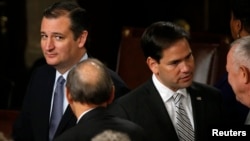Republican presidential candidates Marco Rubio and Ted Cruz slammed U.S. President Barack Obama for his reported plans to visit Cuba next month.
Speaking at a town hall Thursday in South Carolina, the presidential hopefuls, who are both of Cuban descent, each said they would not visit the communist-run country.
"Not if it's not a free Cuba," said Rubio, the Florida senator whose parents immigrated to the U.S. in the 1950s before Fidel Castro came to power.
The Rubio and Cruz opposition to the trip is another fault line separating the fractious Republican and Democratic presidential candidates in the 2016 national campaign.
Both Democratic presidential candidates, former Secretary of State Hillary Clinton and Vermont Senator Bernie Sanders, have supported Obama's overtures to renew diplomatic ties with Cuba, ending five decades of hostilities borne in the Cold War.
Clinton has said that the Republican presidential candidates "have it backward. Engagement is not a gift to the Castros, its a threat to the Castros. An American embassy in Havana isn’t a concession, it’s a beacon.” Sanders has called the renewal of Cuban-American ties a "major step forward" and traveled to Cuba in 2014 to discuss trade, health care and human rights issues.
Hours before Thursday's town hall began, reports emerged that Obama will visit Cuba next month as part of his efforts to normalize relations with Havana. The countries have opened embassies in Washington and Havana and this week signed a pact allowing American air carriers to schedule up to 110 flights a day to the island, located 145 kilometers off the coast of the southeastern U.S. state of Florida.
As part of the new links between the two countries, Obama has used his executive authority to end some of the decades-long economic restrictions on Cuba, although a trade embargo is still in place. Obama, a Democrat, has called on the Republican-controlled U.S. Congress to formally lift the embargo against Havana, saying it is ineffective and harmful.
More: Sanctions Slow Granting of Cuba Business Licenses
Republicans have shown no interest in ending the embargo, but it has not been a major issue on the campaign trail for the presidential candidates.
It could become more politically important, particularly in the battleground state on Florida, in the November national election when the contest has narrowed to the two Republican and Democratic nominees. Thousands of Cuban refugees moved to Florida as Fidel Castro took power and many remain adamantly opposed to closer links to their homeland.
For Rubio & Cruz, Cuba issue is personal
Rubio said the White House's historic thaw with Cuba has not resulted in any improvement in human rights. "The Cuban government remains as oppressive as ever," he said.
Cruz, a U.S. senator from Texas, said he also would not visit Cuba "as long as the Castros are in power," first with revolutionary Fidel Castro, and now with his brother, President Raul Castro.
Cruz said his father "has seen firsthand the evil and oppression in Cuba," where he was arrested and jailed before fleeing to the United States in 1957, although he was apprehended by forces supporting Cuban dictator Fulgencio Batista for fighting with Fidel Castro's revolutionaries trying to overthrow the right-wing ruler.
The Republican candidate said he thinks Obama's trip is "a real mistake. I think the president instead ought to be pushing for a free Cuba."
By going to Cuba now, Obama will "essentially act as an apologist," Cruz added.





